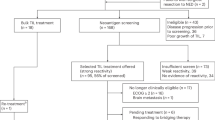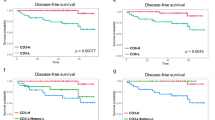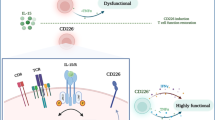Abstract
Metastatic colorectal cancer is usually progressive despite infiltration of the tumours by T lymphocytes, suggesting that these tumour-infiltrating lymphocytes (TILs) are functionally deficient. Recently, TILs from other tumours have been shown to express reduced levels of the T-cell receptor signal-transducing CD3-zeta chain. We were interested to determine whether a similar abnormality existed in TILs from human colorectal hepatic metastasis (CHM) and, if so, whether correcting the abnormality in vitro would restore anti-tumour activity and provide support for the development of immunotherapy for colorectal hepatic metastases. Twelve of 19 TILs from colorectal hepatic metastases were successfully expanded in vitro in high-dose recombinant interleukin 2 (rlL-2) and their specific anti-tumour cytolytic activity was determined. CD3-positive (CD3+) TILs were HLA-Drhigh and CD69high, suggesting that they had been activated by exposure to antigen but expressed low levels of CD25, CD71 and the nuclear proliferation antigen Ki-67. Furthermore, they showed reduced expression of CD3-zeta compared with autologous peripheral blood T cells (PBTs) and failed to proliferate in the absence of high-dose rIL-2. Expansion of TILs in rIL-2 resulted in restoration of CD3-zeta expression and the ability to lyse K562 and Daudi cells but not autologous tumour cells. The absence of autologous tumour-specific cytolytic T-cell (CTL) activity may be due to the poor immunogenicity of colorectal tumour cells, which we found expressed only low levels of MHC I antigens and CD54 and failed to express MHC II antigens or the co-stimulatory molecules CD80, CD86 or CD106. The inability of rIL-2 to generate tumour-specific CTLs despite restoration of CD3-zeta expression and the presence of an intact lytic mechanism suggests that successful immunotherapy may require the development of strategies to increase the immunogenicity of this tumour.
This is a preview of subscription content, access via your institution
Access options
Subscribe to this journal
Receive 24 print issues and online access
269,00 € per year
only 11,21 € per issue
Buy this article
- Purchase on SpringerLink
- Instant access to full article PDF
Prices may be subject to local taxes which are calculated during checkout
Similar content being viewed by others
Author information
Authors and Affiliations
Rights and permissions
About this article
Cite this article
Yoong, K., Adams, D. Interleukin 2 restores CD3-ζ chain expression but fails to generate tumour-specific lytic activity in tumour-infiltrating lymphocytes derived from human colorectal hepatic metastases. Br J Cancer 77, 1072–1081 (1998). https://doi.org/10.1038/bjc.1998.179
Issue Date:
DOI: https://doi.org/10.1038/bjc.1998.179
This article is cited by
-
Vitronectin in human hepatic tumours contributes to the recruitment of lymphocytes in an αvβ3-independent manner
British Journal of Cancer (2006)
-
T lymphocytes isolated from patients with advanced colorectal cancer are suitable for gene immunotherapy approaches
British Journal of Cancer (2003)



